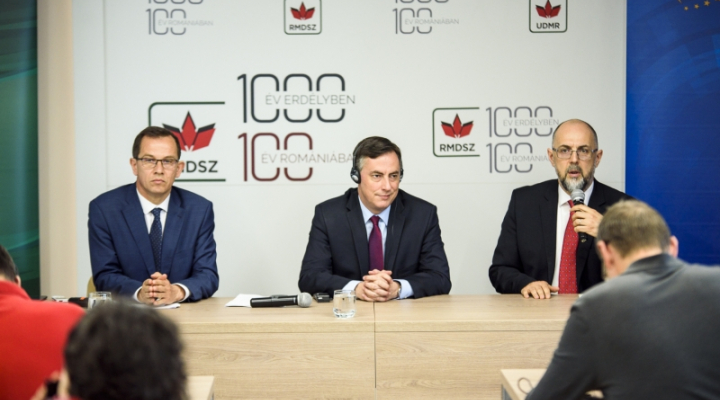David McAllister visited headquarters of Hungarian minority party RMDSZ in Transylvania
"Although the situation of different autochthonous minorities varies extremely in the EU, it would be necessary to create a European legal framework. The European People's Party (EPP) will continue to keep minority protection on the European Union’s agenda" - said German MEP David McAllister on Thursday in Cluj-Napoca.
David McAllister, President of the European Parliament's Foreign Affairs Committee, Vice-President of the European People's Party visited Transylvania on 26th April, invited by Csaba Sógor. "On the international stage Romania claims to treat exemplary the enforcement of minority rights, so it is of utmost importance to inform European politicians about the situation at first hand", said Csaba Sógor.
In the morning the European politician was updated by Hunor Kelemen, President of the RMDSZ on the situation of the Hungarian community in Transylvania, event which was followed by a press conference where EPP vice-president presented the purpose of his visit. In the afternoon David McAllister met with Hungarian students while giving a lecture on the possible effects of Brexit at the VIII. Students' Scientific Conference organized by the Cluj-Napoca branch of the Sapientia University.
Concerning Hungarian minority protection ambitions in Transylvania, David McAllister expressed his support regarding Minority Safepack initiative. He explained that according to him the democratic European Union means giving citizens the opportunity to express their views and needs. The EPP vice-president thinks there are many good examples of successful practice of minority rights in the EU and there is no doubt that finding solutions favors both the majority and the minority. "We find that countries which ensure minority rights are economically more stable and are developing dynamically", he said.
The decision of the British regarding Brexit should be respected, but it is obvious by now that none of the parties are favored by the leave of the United Kingdom which seems to be expensive for both sides. "We were afraid that Brexit would cause very different attitudes in Member States, but we found that the EU 27 was acting unitedly on the issue. It is important that following Brexit the Member States began dialogs about the future of Europe, the necessary reforms, strengthening defense network and security, as well as the importance of protecting the single market. We have to be united on these issues in the future as well", said McAllister.
He explained that following Brexit the budget of the European Union for the next seven-year budget cycle will be reduced by 10-13 billion euros. Although less resources will be available then before, the EU must spend more on education, research, migration and internal security. "This issue will be a big challenge for the EU. Germany has already announced that it is willing to invest more in the EU, because it can only remain strong if the European Union stays stable", he said. Csaba Sógor pointed out regarding the next budget cycle that it is of utmost importance for the Hungarian minority that resources for cohesion policy, i.e. reducing the backwardness of the least-favored regions, would still be available in the future.
The EPP is already preparing for the next European Parliament elections on 26 May 2019. McAllister has revealed that at the november Congress the party will decide on the top candidate of the EPP nominated as head of the European Commission. The EPP's firm objective is to become the strongest party in the European Parliament, so in order to implement fundamental reforms in the European Union, it focuses on a stable parliamentary majority.











